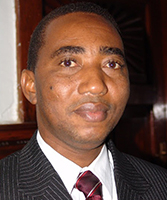Alumni of the Month

Shamsi Vuai NAHODHA
YEAR OF MATRICULATION: 1984
EDUCATION:
Hon. Mr. Shamsi Vuai Nahodha is our UDSM ‘Alumnus of the Month’ for November 2021 – a man many recall to have been such a cool, attentive and welcoming personality during his student days. Apparently, he continued to be a man of firm attributes of a kind, loyal yet principled leader he symbolises today. He was born on the 20th of November in 1962, in the-then Sultanate of Zanzibar. Upon reaching seven, his parents enrolled him at Kiongoni Primary School for the seven years of primary education (1969-1978). From Kiongoni, he proceeded to secondary education at Ben-Bella Secondary School (1979-1980). In 1980, he entered the Institute of Kiswahili and Foreign Languages for a four-year diploma course in languages (1980-1984).
In 1984, he joined the University of Dar es Salaam for a three-year degree study programme in languages and language education, thereby preparing himself for a teaching career in languages. In 1987, he successfully completed the programme and earned a B.A (Education). On completion of his undergraduate studies in 1987, Mr. Nahodha joined the educational-training team of the JKU [Jeshi la Kujenga Uchumi] for two years in 1987-1988, after which he concerned himself more with regular politics of development and participation.
Keen to advance himself professionally, in 1996, Mr. Nahodha decided to undertake a postgraduate training course in international relations and diplomacy at the Centre for Foreign Relations at Kurasini in Dar es Salaam, from where he obtained a diploma in 1997. In the next decade, he was to be involved in elective politics, winning Mwera constituency for the House of Representatives for the period running from 2000-2005. In the same year, 2005, Mr. Nahodha got an opportunity to enrol at the Open University of Tanzania (OUT) for a Master of Business Administration (MBA) degree, which he earned three years later in 2008.
Although a teacher by training, Shamsi Vuai Nahodha has spent most of his working life in politics and political leadership, particularly since the year 2000 when he first entered the House of Representatives as a Member of the House of Representatives for Mwera (2000-2005). He was subsequently appointed as Chief Minister [Waziri Kiongozi] in the Zanzibar Revolutionary Government (2000-10) and, thereafter, elected as Member of the Union Parliament for Mwanakwerekwe (2005-2010 and 2010-15). Hon. Nahodha served also as a member both in his Party’s [CCM] Central Committee and in the National Executive Council (from 2000 to 2016). Within this time period, he was trusted with high-level government appointments, namely as Minister for the Union Ministry of Home Affairs (2010-2012), for Defence and National Service (2012-13), as well as Member to the Constitutional, Legal Affairs and Governance Committee of Parliament (2013-2015). Hon. Nahodha was reelected to the Union Parliament in 2016 for the five-year term to 2020.
A few things could be said in fond reflections on Shamsi Nahodha’s sincerity in approach to life. For instance, while in the Ministry of Home Affairs (28th November 2010–7th May 2012), he was passionately concerned about the safety and security of the country as a nation and as two inseparable parts of the Union. He was clearly perturbed by hypercritical overtones on the Union. On 26th April 2013, on the occasion of the 49th anniversary of the Tanganyika-Zanzibar Union, he hastened to rebuke those ‘trouble-shooters and ‘power-drunk leaders’ on both sides of the Union who continued to demand a ‘signed certificate of Union’ as a condition of legality for the Tanzanian Government—something that sounded absurd a whole 49 years after that voluntary event and fact back in 1964! His speech that day sent the ‘troubleshooters and power-drunk leaders’ down to their knees.
Another matter for which his role in government is remembered is in connection with the plight of illegal immigrants, especially from Eritrea, Ethiopia and Somalia, who frequently got arrested and stranded in Tanzania. Against this kind of human disaster, he committed himself to serious presentations with like-minded institutions for a solution. The result was a US$2,400,000-worth ‘tripartite’ (collaborative) initiative with the Government of Japan (through the Japanese Embassy) and the International Organization of Migration (IOM) to provide assistance [11 vehicles and 3 patrolling boats] to mitigate the difficulties faced with irregular migrants and migrant children, a project that was launched on 18th January 2012.

